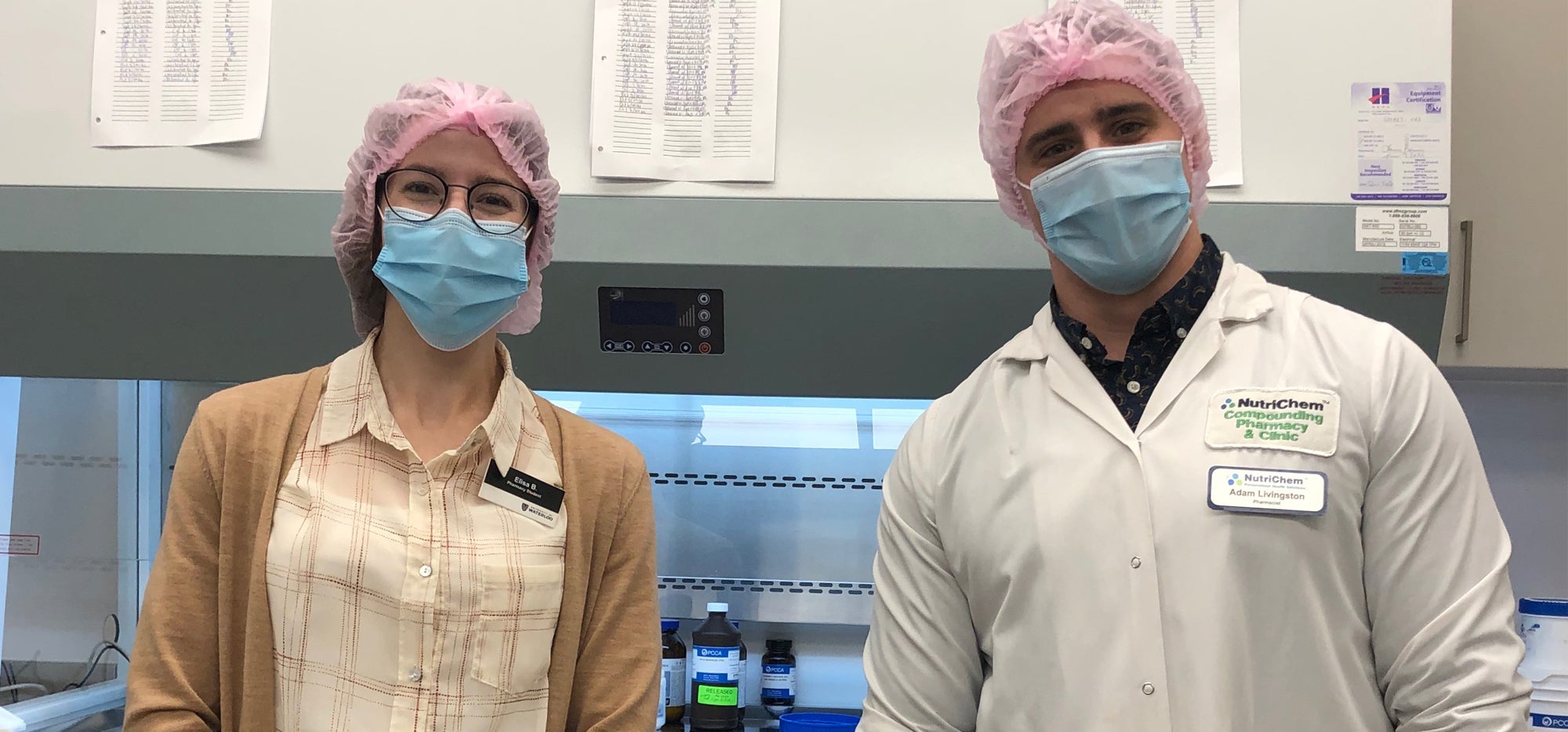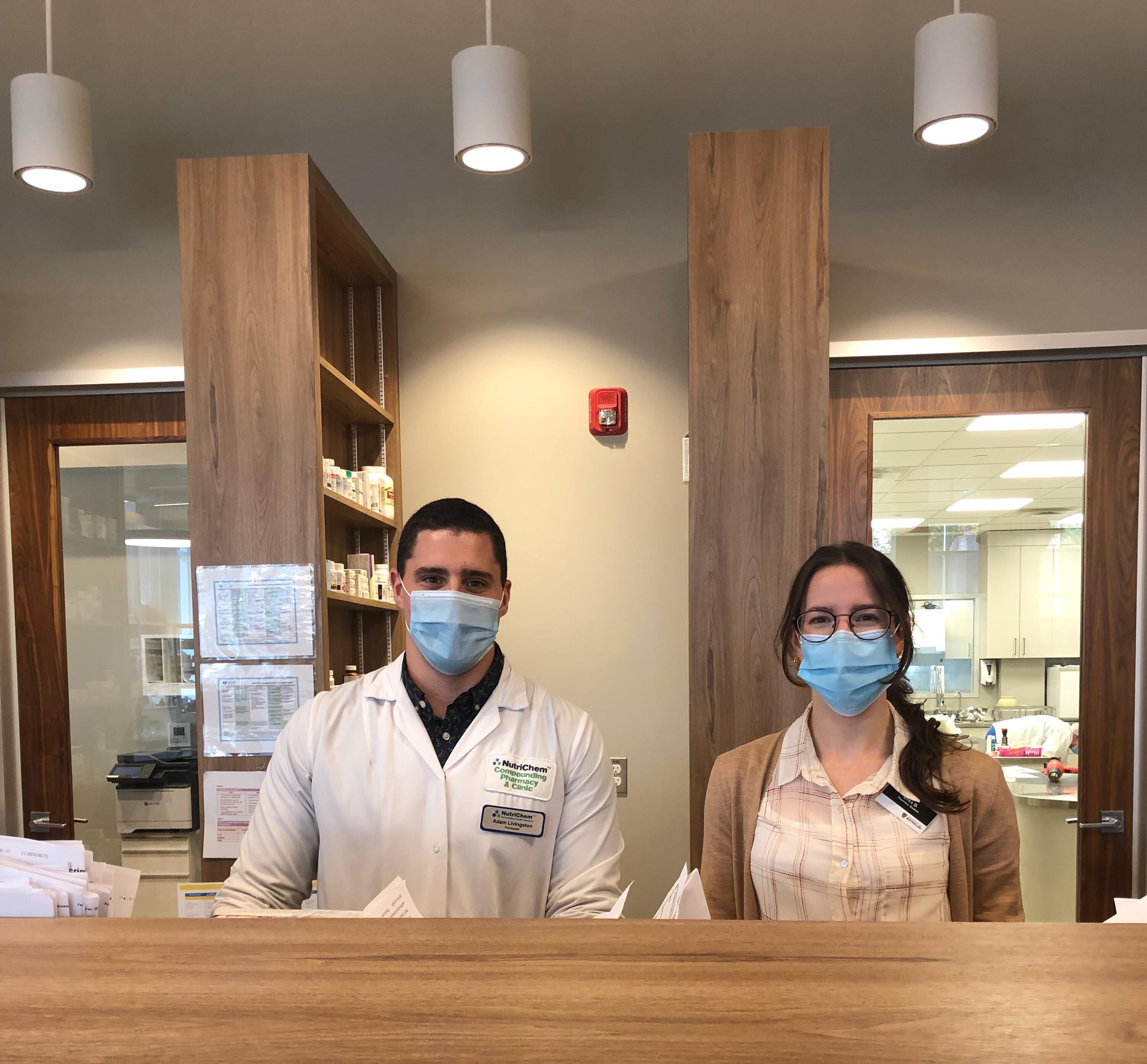
Co-op student splits work term between compounding pharmacy and Canadian Armed Forces

Elisa Basile’s work term was altered by COVID-19 but led to unique experiences in two workplaces. The above shows Elisa and her preceptor Adam Livingston, the Designated Manager at NutriChem. They are in a section of NutriChem's compounding laboratory, a non-sterile negative pressure room where the hormones and other hazardous agents are compounded.
In May 2020, Elisa Basile was supposed to start her co-op work term with the Canadian Armed Forces (CAF) Health Services Clinic in Ottawa. But COVID-19 created complications for the third-year pharmacy student, and her security clearance was delayed.
Because she couldn’t start work on time with the CAF, she turned to other options and reached out to a former employer, NutriChem Clinic and Compounding Pharmacy. With support from the Waterloo Pharmacy experiential team, Elisa completed her work term between the two locations, starting at NutriChem full-time and transitioning to part-time work when her clearance came through for the CAF clinic and she began working there.
“NutriChem is the kind of pharmacy that people come to when they need a problem solved,” Elisa says. “I’m so grateful they took me on despite the short notice.”
NutriChem is a specialty pharmacy that includes a clinic staffed by clinical pharmacists and other health-care professionals.
“In school we learn of all the interesting roles a pharmacist can play. At NutriChem these clinical pharmacists really embody that,” says Elisa. For example, her colleagues used an appointment-based model to counsel patients, and these appointments are made based on the pharmacist’s area of expertise. The team has individuals with expert knowledge in topics like menopause, hormone therapy, deprescribing, the gut microbiome and more.
They facility has an updated compounding laboratory designed to comply with the latest NAPRA guidelines.
“Often, patients we see have tried going to others for help, but no one can figure out exactly how to do their prescription,” Elisa says. “With the variety of compounding services and the knowledge of the staff, the NutriChem team is usually able to solve those problems and we worked in partnership with the patient’s health-care provider to determine the best therapeutic options.”

COVID-19 caused some of the counselling services typically performed in person to take place over the phone, and Elisa spoke with patients this way. She also supported the increased requests for medications delivery and had the opportunity to work in the compounding laboratory.
“I appreciated working with the dispensary and laboratory staff. They are a skilled team, and they taught me a lot about the behind the scene logistics of making a niche pharmacy run smoothly.
Counselling over the phone due to COVID-19 also provided an interesting learning opportunity for Elisa, given the unique services NutriChem provides.
“We’d be sending patients with medication compounded in a new format, something they hadn’t seen before. Over the phone, we’d walk them through how to use it, how the product is different and why the changes were made,” she says.
Later in the term, Elisa was able to begin work at the CAF clinic. The location provides health services to military personnel, and although those services were altered due to COVID-19, Elisa was still able to support their pharmacy department.
“It was especially unique because the pharmacist scope is much wider in the military, so I was able to observe pharmacists working with a broader scope than those I’d previously worked with,” she says. “I saw first-hand how the team stepped up in the time of a pandemic, when a lot of other health services in the military were called to serve elsewhere.”
On the pharmacy team, Elisa provided counselling and supported medication pick up. Providing this service for armed forces personnel differed from her previous experiences as well.
“Sometimes we were supplying medications to people being deployed. We’d have to navigate the laws in the country they were travelling to and determine if there were rules or restrictions on carrying more than a year’s supply of a medication in a new country.”
In both work environments, Elisa collaborated with an interprofessional team. At the CAF clinic, she worked alongside physicians who provided support and clarification as needed. At NutriChem, in addition to the team at the clinic, Elisa also reached out to compounding experts via the Professional Compounding Centres of America (PCCA). This organization has a team of expert pharmacist compounders who provide support by phone to health-care professionals.
“The PCCA team was an incredible resource,” Elisa says. “You can call them and say ‘I have this prescription, these ingredients and these tools. What are my options,’ and they walk you through using the latest evidence.”
The compounding focus at NutriChem led to challenges for Elisa. Working with unique formulations meant that she did not always have access to product monographs.
“You don’t always have the obvious resources to consult in situations like this,” she says. “I had to rely on my research skills and go back to primary sources of resource to get the info I needed.”
It was a workplace that supported innovation and working there encouraged Elisa to adopt that questioning mindset.
“I learned that it’s important to be curious. It’s okay to question a prescription that you get. In compounding, it’s easy to simply follow the instructions, but sometimes with a little critical thinking and research, you’re able to come up with an even better solution.”